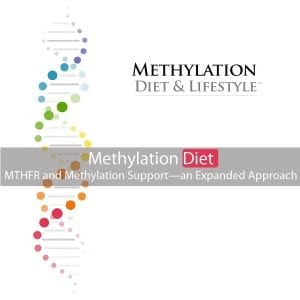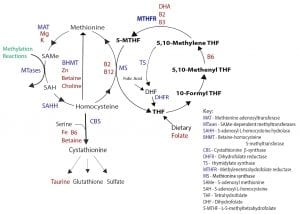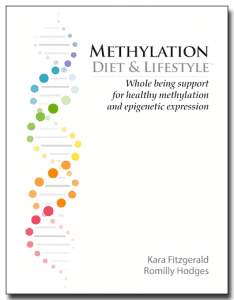 I’m thrilled to announce the launch of Kara Fitzgerald and Romilly Hodges’ new book the “Methylation Diet and Lifestyle.” Methylation is a topic we cover extensively in our Advanced Practitioner training program at the BioIndividual Nutrition Institute. I’ve admired Kara Fitzgerald’s work for over 8 years. She’s brilliant at understanding the biochemistry of the body and the importance of nutrients and food. When I learned that she came out with a new book recently on the Methylation Diet, I knew this topic was PERFECT for our BioIndividual Nutrition members. Here’s the article Kara and Romilly wrote for us, as well as more on their book and an online webinar session we will be doing in August…
I’m thrilled to announce the launch of Kara Fitzgerald and Romilly Hodges’ new book the “Methylation Diet and Lifestyle.” Methylation is a topic we cover extensively in our Advanced Practitioner training program at the BioIndividual Nutrition Institute. I’ve admired Kara Fitzgerald’s work for over 8 years. She’s brilliant at understanding the biochemistry of the body and the importance of nutrients and food. When I learned that she came out with a new book recently on the Methylation Diet, I knew this topic was PERFECT for our BioIndividual Nutrition members. Here’s the article Kara and Romilly wrote for us, as well as more on their book and an online webinar session we will be doing in August…
The Methylation Diet: MTHFR and Methylation Support—an Expanded Approach
by Kara Fitzgerald and Romilly Hodges
This is a must-read for anyone who knows they have an MTHFR, or other methylation-related, gene polymorphism or is at risk for hypomethylation-related conditions including autism.
The Importance of Methylation
Defects in the body’s methylation process have been of interest to many health communities since MTHFR genetic testing, as well as functional testing for markers such as homocysteine, have become more widely-available and since the connection to different disease states—ADD, autism, cancer, diabetes, heart disease, Alzheimer’s disease, Parkinson’s disease, immune hypersensitivity, inflammation and more—is increasingly recognized. Even before that, the connection between maternal folate deficiency (one of the key methylation nutrients) and neural tube defects in children was observed and validated, leading to broad-based folic acid food fortification initiatives.
Methylation is such a fundamental process that each of our cells is continually using for many, many activities, ranging from cell division, immune cell formation, creating neurotransmitters, detoxification, and hormone metabolism, to regulating even how our genes get expressed.
There has just been this remarkable boom in methylation research, and as Functional Medicine practitioners we obviously want to fold that in to how we work with patients. This is what has led to the use of supplemental nutrient cofactors, such as folate, B12, B6, and so on, to support methylation pathways (Figure 1). The intention has been to overcome methylation deficits by pushing those reactions on to a greater level of activity, or bypassing blockages in the folate cycle completely, such as with methylated folates (5-methyltetrahydrofolate, the product of the MTHFR reaction). This is, no doubt, an important goal.
Figure 1: Core Methylation Pathways and Nutrient Cofactors
 The problem with using this approach alone is that we just don’t know what the end outcome on overall methylation status, especially epigenetic methylation, is. Methylation in the body exists in a state of fluctuation but also, importantly, balance. There is research to show that too much methylation can be problematic too—excessive methylation on the epigenome is associated with cancer, autoimmunity, and allergies in particular. Epigenetic methylation is typically associated with gene repression, which can be beneficial in some circumstances, but not if we are repressing an important anti-cancer gene, or a gene that is important for immune balance.
The problem with using this approach alone is that we just don’t know what the end outcome on overall methylation status, especially epigenetic methylation, is. Methylation in the body exists in a state of fluctuation but also, importantly, balance. There is research to show that too much methylation can be problematic too—excessive methylation on the epigenome is associated with cancer, autoimmunity, and allergies in particular. Epigenetic methylation is typically associated with gene repression, which can be beneficial in some circumstances, but not if we are repressing an important anti-cancer gene, or a gene that is important for immune balance.
So, of course we want to support proper methylation activity in the body, and yes we can use targeted supplemental methyl donors and cofactors where needed. However, there is so much more we can be doing to support healthy methylation beyond supplements. In our practice we have expanded our approach to incorporate evidence-based diet and lifestyle factors that not only are effective, but are extremely safe. This allows us to be more judicious and conservative in our use of supplementation, provides useful tools for those who actually don’t tolerate methylation supplementation (yes, this happens), and gives us a long-term support framework that can help patients over a lifetime.
We have so many more tools to support healthy methylation beyond supplementation.
Tools to Support Methylation
Food Choices
What does this look like? To start with, we look at sources of nutrients. Of course nutrients have a key role to play, but we can also get nutrients from food based sources, not just supplements (Figure 1). We specifically designed our Food Plans, Menu Plans and recipes to be rich in methylation nutrients, and compatible with other commonly-used dietary programs such as gluten-free and dairy-free.
Figure 1: Examples of Foods Rich in Methylation Nutrients
| Methylation ‘Superfood’ | Rich in these nutrients |
| Beets Daikon radish Dark leafy greens Egg Legumes Liver |
Betaine Magnesium, potassium, B2, B6, folate Potassium, folate, betaine Methionine, cysteine, taurine, B2, B12, choline, sulfur compounds Magnesium, potassium, folate, sulfur compounds Cysteine, B2, B3, B6, folate, B12, betaine, choline |
Support the Microbiome
We can also support nutrient status through the microbiome. Those little guys in our gut actually have a really important role to play in synthesizing nutrients for us, including B vitamins such as folate (Figure 2). In fact, many of them even synthesize the methylated forms of folate, and data has shown that supplementing specific bacterial species can even raise folate status, and lower homocysteine independently of any other changes. Prebiotic foods can support this activity even more.
Figure 2: Example Microbial Producers of Folate
| Lactobacillus plantarum Bifidobacterium bifidum Bifidobacterium infantis Bifidobacterium breve Bifidobacterium longum Bifidobacterium adolescentis Bifidobacterium pseudocatenulatum |
Avoid Nutrient and Methyl Depletors
Another way to support nutrient and methylation status is to minimize factors that actually deplete nutrients and methyl donors. This is a really important concept, termed ‘methyl donor drain’. One example of this at work relates to stress—when we are in a chronic state of fight-or-flight, we are using methyl donors both to produce, and also to break down, adrenaline. Those methyl donors are ‘spent’, so that they are no longer available for use in other methylation activity. And there are many other potential methyl donor drainers.
Methylation Balance
Beyond nutrients, it is really important to identify and implement those techniques that help promote methylation balance in the body. Again we can look to food here, among other factors, since there are specific food-based components—such as found in berries, rosemary, and more—that demonstrate adaptogenic effects on epigenetic methylation, providing those ‘checks-and-balances’ that will prevent inappropriate excessive methylation on our genome.
Inflammation and Additional Factors
These are some, but by no means all, of the concepts that we’ve incorporated into our program; we also work on inflammation, oxidative stress, mitochondrial fitness, sleep, exercise, environmental toxins (Figure 3), medication effects, dietary patterns and macronutrient ratios, meal timing and more. These factors address both the availability of methyl donors in the body, as well as that homeodynamic methylation balance.
Figure 3: Environmental Toxins That are Known to Alter DNA Methylation
| Pesticides Fertilizers Automobile fumes Bisphenol A (BPA) Phthalates Persistent Organic Pollutants (POPs) Jet fuel Benzene Mold toxins (e.g. aflatoxin) Arsenic Mercury Lead Cadmium Nickel |
 To find out exactly how these factors influence methylation and how to apply them for a holistic approach to methylation support, we have published our program in an eBook, which is available at www.drkarafitzgerald.com/practitioners/eBook. We encourage you to read it, apply it, and tell others about it. Methylation may be just one piece of the puzzle for autism and other conditions, but it is such a fundamental one. This approach is a much-needed evolution of how we need to be thinking about supporting healthy methylation.
To find out exactly how these factors influence methylation and how to apply them for a holistic approach to methylation support, we have published our program in an eBook, which is available at www.drkarafitzgerald.com/practitioners/eBook. We encourage you to read it, apply it, and tell others about it. Methylation may be just one piece of the puzzle for autism and other conditions, but it is such a fundamental one. This approach is a much-needed evolution of how we need to be thinking about supporting healthy methylation.
Use the following code for a 10% discount on Methylation Diet and Lifestyle: BNI10
Sign up for our free webinar on August 16 at: https://bioindividualnutrition.com/the-methylation-diet-webinar/
About the Authors:
 Dr. Kara Fitzgerald received her doctorate of naturopathic medicine from National College of Natural Medicine in Portland, Oregon. She completed the first CNME-accredited post-doctorate position in nutritional biochemistry and laboratory science at Metametrix (now Genova) Clinical Laboratory under the direction of Richard Lord, Ph.D. Her residency was completed at Progressive Medical Center, a large, integrative medical practice in Atlanta, Georgia. Dr. Fitzgerald is lead author and editor of Case Studies in Integrative and Functional Medicine, a contributing author to Laboratory Evaluations for Integrative and Functional Medicine and the Institute for Functional Medicine’s updated Textbook for Functional Medicine. She has been published in numerous peer-reviewed journals. Dr. Fitzgerald is on faculty at the Institute for Functional Medicine, and is an Institute for Functional Medicine Certified Practitioner. She is a clinician researcher for The Institute for Therapeutic Discovery. Dr. Fitzgerald regularly lectures internationally for several organizations and is in private practice in Sandy Hook, Connecticut.
Dr. Kara Fitzgerald received her doctorate of naturopathic medicine from National College of Natural Medicine in Portland, Oregon. She completed the first CNME-accredited post-doctorate position in nutritional biochemistry and laboratory science at Metametrix (now Genova) Clinical Laboratory under the direction of Richard Lord, Ph.D. Her residency was completed at Progressive Medical Center, a large, integrative medical practice in Atlanta, Georgia. Dr. Fitzgerald is lead author and editor of Case Studies in Integrative and Functional Medicine, a contributing author to Laboratory Evaluations for Integrative and Functional Medicine and the Institute for Functional Medicine’s updated Textbook for Functional Medicine. She has been published in numerous peer-reviewed journals. Dr. Fitzgerald is on faculty at the Institute for Functional Medicine, and is an Institute for Functional Medicine Certified Practitioner. She is a clinician researcher for The Institute for Therapeutic Discovery. Dr. Fitzgerald regularly lectures internationally for several organizations and is in private practice in Sandy Hook, Connecticut.
 Romilly Hodges completed her Master’s degree in Human Nutrition at the University of Bridgeport, CT. She is a Certified Nutrition Specialist through the Board for the Certification of Nutrition Specialists, and completed her practice hours under the supervision of Dr. Deanna Minich, PhD and Dr. Kara Fitzgerald, ND. She has published in the Journal of Nutrition and Metabolism on food-based modulators of detoxification enzymes, and has been a contributing author to Sinatra & Houston, Nutritional and Integrative Strategies for Cardiovascular Medicine. She has been teaching assistant to Dr. Minich for the Certified Food and Spirit Practitioner Program and the Food and Spirit Advanced Detoxification Module. She is the staff nutritionist at the office of Dr. Kara Fitzgerald where she advises and supports patients in the implementation of complex, multi-layered dietary and nutritional protocols that are uniquely personalized to each individual’s needs.
Romilly Hodges completed her Master’s degree in Human Nutrition at the University of Bridgeport, CT. She is a Certified Nutrition Specialist through the Board for the Certification of Nutrition Specialists, and completed her practice hours under the supervision of Dr. Deanna Minich, PhD and Dr. Kara Fitzgerald, ND. She has published in the Journal of Nutrition and Metabolism on food-based modulators of detoxification enzymes, and has been a contributing author to Sinatra & Houston, Nutritional and Integrative Strategies for Cardiovascular Medicine. She has been teaching assistant to Dr. Minich for the Certified Food and Spirit Practitioner Program and the Food and Spirit Advanced Detoxification Module. She is the staff nutritionist at the office of Dr. Kara Fitzgerald where she advises and supports patients in the implementation of complex, multi-layered dietary and nutritional protocols that are uniquely personalized to each individual’s needs.


